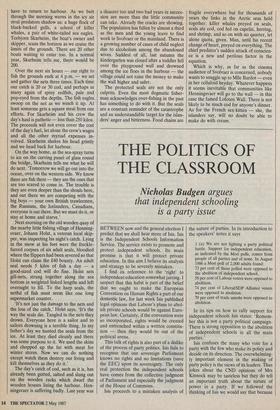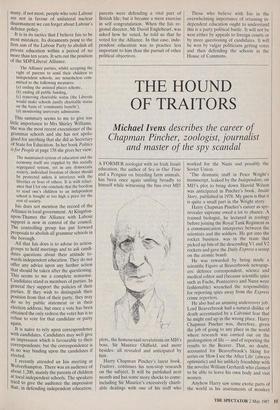THE POLITICS OF THE CLASSROOM
Nicholas Budgen argues
that independent schooling is a party issue
BETWEEN now and the general election I predict that we shall hear more of Isis. Isis is the Independent Schools Information Service. The service exists to promote and protect independent schools. Its main promise is that it will protect private education. In this aim I believe its analysis and strategy to be severely mistaken.
I find its reference to the 'right' to independent education somewhat jarring. I suspect that this habit is part of the belief that we ought to make the European Convention on Human Rights a part of our domestic law, for last week Isis published legal opinions that Labour's plans to abol- ish private schools would be against Euro- pean law. Certainly, if the convention were so incorporated, rights would be created and entrenched within a written constitu- tion — then they would be out of the political arena.
This talk of rights is also part of a dislike of the process of party politics. Isis fails to recognise that our sovereign Parliament knows no rights and no limitations (save the EEC) upon its sovereignty. The only real protection the independent schools have comes from the collective judgment of Parliament and especially the judgment of the House of Commons.
Isis proceeds to a mistaken analysis of the nature of parties. In its introduction to the speakers' notes it says 1 (a) We are not fighting a party political battle. Support for independent education, as indicated by the Mori polls, comes from people of all parties and of none. In August 1986 a Mori poll of 2,000 adults found: 73 per cent of those polled were opposed to the abolition of independent school,
58 per cent of Labour voters were opposed to abolition, 74 per cent of Liberal/SDP Alliance voters were opposed to abolition.
70 per cent of trade unions were opposed to abolition.
In its tips on how to rally support for independent schools Isis states: 'Remem- ber this is not a party political campaign. There is strong opposition to the abolition of independent schools in all the main parties.'
Isis confuses the many who vote for a party with the few who make its policy and decide on its direction. The overwhelming- ly important element in the making of party policy is the views of its leaders. Thus jokes about the CND opinions of Mrs Kinnock may be tasteless but they do tell an important truth about the nature of power in a party. If we followed the thinking of Isis we would say that because many, if not most, people who vote Labour are not in favour of unilateral nuclear disarmament we can forget about Labour's defence policy.
It is in its tactics that I believe Isis to be most mistaken, Its documents point to the firm aim of the Labour Party to abolish all private education within a period of no more than ten years. It sets out the position of the SDP/Liberal Alliance.
The Alliance parties, whilst accepting the right of parents to send their children to independent schools, are nonetheless com- mitted to the following measures: (a) ending the assisted places scheme, (b) ending all public funding, (c) removing charitable status (the Liberals would make schools justify charitable status on the basis of 'community benefit'), (d) monitoring university admissions.
This summary seems to me to give too little importance to Mrs Shirley Williams. She was the most recent executioner of the grammar schools and she has not apolo- gised for anything that she did as Secretary of State for Education. In her hook Politics is for People at page 158 she gives her view:
The maintained system of education and the economy itself are crippled by this socially segregated system, yet in any democratic society, individual freedom of choice should be protected unless it interferes with the liberties or lives of others. It is with reluct- ance that I for one conclude that the freedom to send one's children to an independent school is bought at too high a price for the rest of society.
Isis does not mention the record of the Alliance in local government. At Kingston- upon-Thames the Alliance with Labour support is now in control of the council. The controlling group has put forward proposals to abolish all grammar schools in the borough.
All that Isis does is to advise its action- groups to hold meetings and to ask candi- dates questions about their attitude to- wards independent education. They do not offer any advice upon any further action that should be taken after the questioning. This seems to me a complete nonsense. Candidates stand as members of parties. In general they support the policies of their parties. If they wish to distinguish their position from that of their party, they may do so by public statement or in their election address; but once a vote has been obtained the only redress the voter has is to refuse to vote for that candidate or party again.
It is naïve to rely upon correspondence with candidates. Candidates may well give an impression which is favourable to their correspondents; but the correspondence is in no way binding upon the candidates if elected.
I recently attended an Isis meeting at Wolverhampton. There was an audience of about 1,200, mainly the parents of children at local independent schools. The speakers tried to give the audience the impression that, in defending independent education, parents were defending a vital part of British life; but it became a mere exercise in self congratulation. When the Isis re- gional director, Mr David Engleheart, was asked how he voted, he told us that he voted for the Alliance. In that case, inde- pendent education was in practice less important to him than the pursuit of other political objectives. Those who believe with Isis in the overwhelming importance of retaining in- dependent education ought to understand this is a party political battle. It will not be won either by appeals to foreign courts or by more questioning of candidates. It will be won by vulgar politicians getting votes and then defending the schools in the House of Commons.



















































 Previous page
Previous page